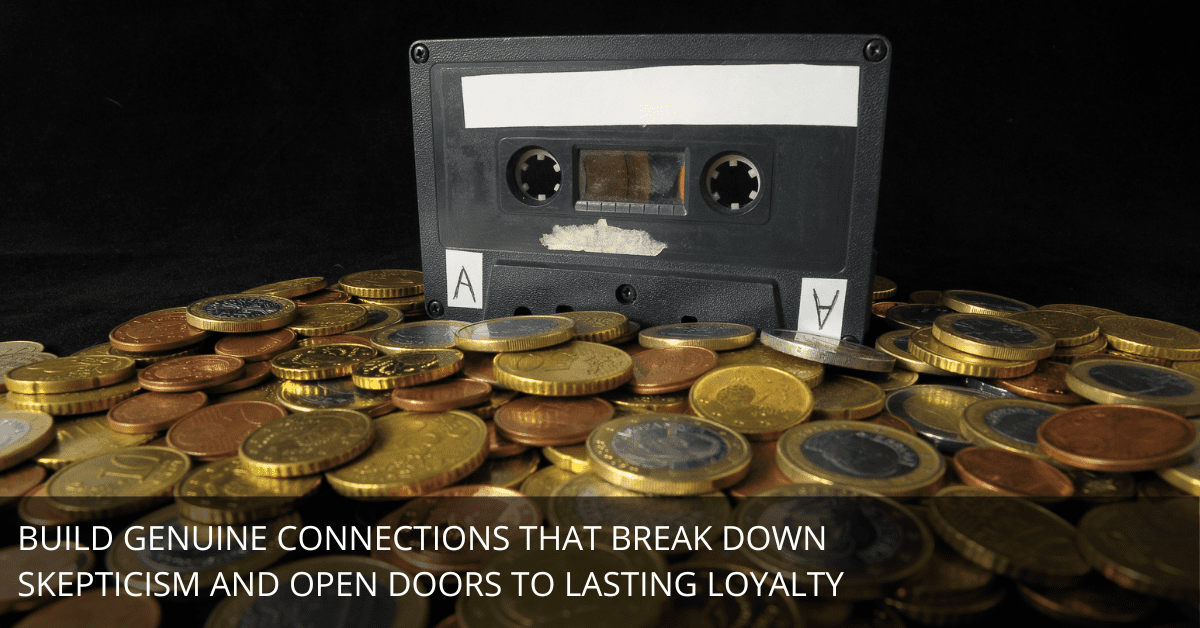
Selling music or creative services today isn’t easy—especially when people have built-in skepticism toward anything that even smells like a sales pitch.
Sales resistance is real, and it’s high. Most customers are wary of upsells, too-good-to-be-true promises, and bait-and-switch offers. It’s not enough to just showcase your music or services; you need to be smart and strategic about how you present your offer. In the Encore Client System, transparency and delivering genuine value upfront are the way forward.
Here’s how to break down those walls of resistance, build real trust, and keep fans and clients coming back.
1. Get Real and Transparent
Most people’s first reaction to a sales pitch is, “What’s the catch?” They’re expecting the fine print, the hidden costs, or the upsell lurking at the end. Counter this by being upfront about everything.
If your goal is to get people to sign up for a monthly membership or coaching session, say so directly. Transparency shows confidence in what you’re offering and lets people know they can trust you from the start.
If you’re selling a workshop, tell them exactly what they’ll learn, how long it will take, and any prerequisites. Mention the price upfront if you can. Let them know if there’s an upsell, like a personal follow-up or a deep dive session, and explain why it’s valuable. Honesty is refreshing in a world full of hidden fees and tricky pricing.
2. Offer Genuine Value Before Asking for Anything
People don’t want to spend their money on someone they barely know. To overcome that, lead with a free or low-cost offer that actually helps your audience. It could be a PDF guide on building stage presence, a video series on mastering vocal control, or an eBook on writing powerful lyrics. This lets people experience your expertise and see your value without feeling pressured to buy.
Think about a small but impactful resource. If you’re offering vocal coaching, share a simple breathing exercise they can try immediately to improve their singing. Not only does this help people, but it also demonstrates that you have knowledge worth paying for. If they get results from your freebie, they’ll be more open to exploring what you can do for them at the next level.
3. Be Clear About the Benefits, Not Just Features
Selling music or music services isn’t just about the product—it’s about the transformation. People buy experiences and outcomes, not just sessions or tracks.
Instead of listing the “features” of your music coaching (like lesson length or practice exercises), focus on what they’ll get from it. Will they feel more confident on stage? Learn to improvise seamlessly? Build a strong and reliable vocal technique?
Here’s a way to frame it: instead of saying, “This coaching session is an hour long and includes breathing exercises,” try, “After one hour with this technique, you’ll feel your voice strengthen, gain control, and know exactly what to practice to keep it improving.” Focus on the benefits and the real-life outcomes they’ll experience, and you’ll find that resistance melts away as they start to visualize the result.
4. Use Social Proof to Show Real Results
Sometimes, it’s easier for people to believe others than to believe you. To break through that skepticism, let your clients and fans do the talking. Share testimonials, success stories, or even short messages from past students or fans who’ve benefited from your work.
You could show a testimonial like, “After just three lessons, my confidence on stage has totally transformed,” or “Following these breathing techniques, I’ve been able to hit high notes effortlessly.” These stories provide a concrete example of the transformation your service can bring, building trust and curiosity.
If you’re just starting and don’t have testimonials yet, start collecting them immediately. Even a few sentences about your passion or knowledge can make a huge difference in encouraging new clients to take a chance on you.
5. Build Relationships Before Selling
Nothing kills sales resistance like a genuine connection. When you focus on building a relationship before making any sales pitch, people feel less “sold to” and more engaged. Engage with your audience on social media, post tips or behind-the-scenes looks at your process, or share insights into the work that goes into your music or coaching.
In practical terms, this could mean going live on Instagram to share your story or holding a free Q&A session where people can ask you anything about the music business. Once they feel connected to you, they’ll see you as a trusted resource, not just someone out to make a sale.
When it’s time to pitch a paid offer, you’ll have fans who feel invested in you and ready to support your work.
6. Focus on Small Wins to Build Trust
Sometimes, all it takes is one small win for a potential client to see your value.
Start by giving them something they can achieve immediately with your help. If you’re offering music production services, give away a quick tip on recording high-quality vocals at home. If you’re coaching on songwriting, share a specific tip for overcoming writer’s block.
For example, “Try this: Next time you’re stuck, set a timer for 5 minutes, pick any word, and write down every association you can think of. You’ll break through the block in no time.” When they try it and feel the results, you’ve already proven your value without a single dollar exchanged.
7. Use the Power of Consistency and Familiarity
People are naturally skeptical of one-time offers from people they don’t know. But when they see you consistently delivering value, that skepticism fades. Keep showing up regularly in their inbox, social feed, or wherever they follow you. Share a blend of valuable insights, personal stories, and any free resources you offer.
Over time, your audience will become familiar with you, and when you finally pitch a paid offer, it won’t feel out of the blue. Instead, it’ll feel like the next logical step in a relationship that’s already been built on trust and value.
8. Give Them an Easy Next Step
When it’s time to make your offer, keep the process straightforward. Instead of leading with a complex upsell or multi-tiered membership, start simple. Invite them to try a single session, a one-off workshop, or a sample of your full program. Once they experience the quality of what you offer, they’ll be far more open to the full package.
Let’s say you’re selling a 12-week music program. Instead of pitching the whole thing at once, offer a free preview or an inexpensive introductory session. Once they see the value, you’ll have a natural bridge to upsell the full experience. Make it easy for them to say yes by keeping the next step low-risk and high-reward.
9. Turn Resistance into Trust-Building Moments
Every moment of skepticism is a chance to build trust. When someone asks a challenging question, answer it honestly. If someone expresses doubt, address it head-on. This shows that you’re not afraid of scrutiny and that you’re confident in what you’re offering.
For instance, if someone asks, “Why is your coaching worth $100 per session?” don’t shy away. Explain what they’ll get: "$100 is an investment in your technique, confidence, and career. And I’ve seen my students hit new levels after only a few sessions.”
Be ready to meet their questions with honesty and let them know you’re committed to giving them real value.
10. Close with Confidence, Not Desperation
When you’ve built trust, shown value, and addressed skepticism, closing the sale doesn’t have to be a pushy, uncomfortable process. Present your offer as a natural next step for anyone serious about leveling up their skills or experience. Let them know that the door is open, but they’re free to make the decision when it feels right.
Something like, “If you’re ready to take your songwriting to the next level, I’m here to guide you. Here’s the link if you want to jump in. Let me know if you have questions—I’m excited to help you grow.” A confident close feels like an invitation, not a pressure, and leaves clients feeling empowered to say yes or come back later.
Overcoming sales resistance is an art, and it’s one of the most powerful tools you can master as a musician entrepreneur. Start by being real, offering value, and building connections, and watch as the walls of skepticism start to fall. With time, you’ll find fans and clients who trust, respect, and support you—turning sales resistance into strong, lasting relationships.

